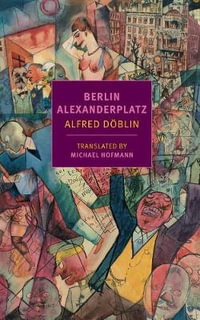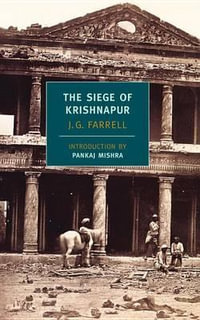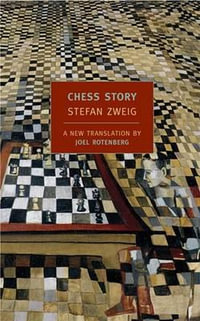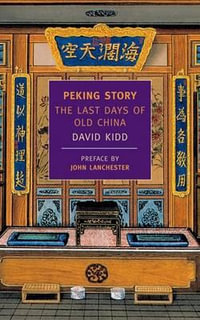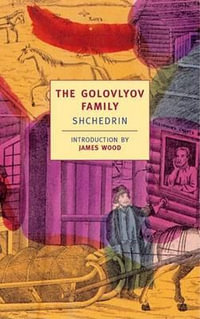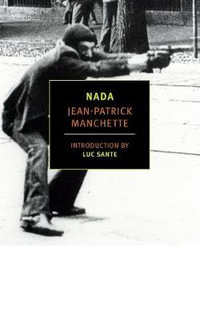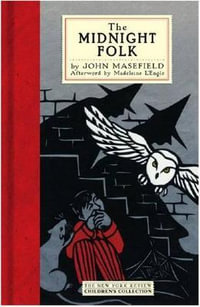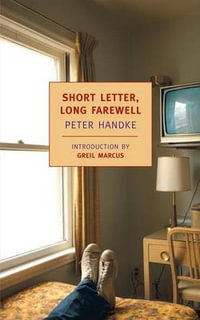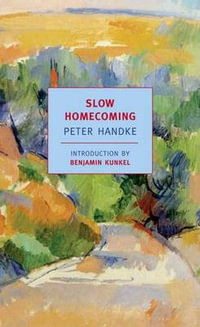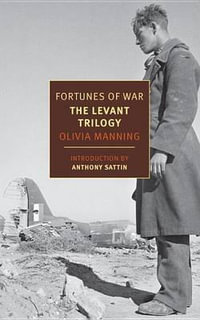
The Road
Stories, Journalism, and Essays
By: Vasily Grossman, Robert Chandler (Editor, Translator), Elizabeth Chandler (Translator), Olga Mukovnikova (Translator)
Paperback | 28 September 2010
At a Glance
384 Pages
20.32 x 12.7 x 2.54
Paperback
$42.57
or 4 interest-free payments of $10.64 with
orAims to ship in 10 to 15 business days
Meticulously edited and presented by Robert Chandler, The Road allows us to see one of the great figures of twentieth-century literature discovering his calling both as a writer and as a man.
About the Author
Vasily Semyonovich Grossman was born on December 12, 1905, in Berdichev, a Ukrainian town that was home to one of Europe’s largest Jewish communities. In 1934 he published both “In the Town of Berdichev”—a short story that won the admiration of such diverse writers as Isaak Babel, Maksim Gorky, and Boris Pilnyak—and a novel, Glyukauf, about the life of the Donbass miners. During the Second World War, Grossman worked as a war correspondent for the army newspaper Red Star, covering nearly all of the most important battles from the defense of Moscow to the fall of Berlin. His vivid yet sober “The Hell of Treblinka” (late 1944), one of the first articles in any language about a Nazi death camp, was translated and used as testimony in the Nuremberg Trials. His novel For a Just Cause (originally titled Stalingrad) was published in 1952 and then fiercely attacked. A new wave of purges—directed against the Jews—was about to begin; if not for Stalin’s death, in March 1953, Grossman would almost certainly have been arrested. During the next few years Grossman, while enjoying public success, worked on his two masterpieces, neither of which was to be published in Russia until the late 1980s: Life and Fate and Everything Flows. The KGB confiscated the manuscript of Life and Fate in February 1961. Grossman was able, however, to continue working on Everything Flows, a novel even more critical of Soviet society than Life and Fate, until his last days in the hospital. He died on September 14, 1964, on the eve of the twenty-third anniversary of the massacre of the Jews of Berdichev, in which his mother had died.
Industry Reviews
"Grossman's unsparing, literary account of the horrific ways Nazi Germany implemented its ethnic-cleansing program at Treblinka was one of the first reports of a death camp anywhere in Europe and eventually provided prosecutors at the Nuremberg War Crimes Tribunal with crucial background information. The surprise is that up until now and English-language translation of Grossman's lengthy article has never been published in its entirety. That will soon change with the publication of The Road, a collection of Grossman's best short stories and war-time articles, including 'The Hell of Treblinka.'" --Tobias Grey, The Wall Street Journal
"Grossman's greatness is manifested in a constant ability to surprise his readers: where we lazily expect darkness and gloom, Grossman provides lightness and humour; what might seem at first glance to be narrow polemic turns out, when paid more attention, to have the grandeur of tragedy." --David Lea, The Literateur
"Vasily Grossman is the Tolstoy of the USSR." --Martin Amis
..".the collection is a treasure trove that lends the reader an insider's understanding of what it was like to live through the Soviet era, at the same time as it introduces us to Grossman's enduring preoccupation with the wonder and terror of humanity....A wonderful collection, this - an introduction to the man and his times that also tells us much about his love, his pity and his faith." --Gillian Slovo, The Guardian
"Grossman's work excavates from the Soviet rubble vital artifacts of the bitter, the tragic, the self-sacrificing, the indomitable and, ultimately, the inspiring..... [The Road is] a volume that is sensitive to Grossman's often lyrical language and frames each entry within its time through comprehensive notes." --Ken Kalfus, The New York Times
"[Grossman's] report 'The Hell of Treblinka' was one of the first to report on an extermination camp, and was used as testimony in the Nuremberg trials. 'Treblinka" is included in the recently published book, The Road -- an original collection of Grossman's short stories, essays, and letters translated into English for the first time.... This collection serves as a fantastic view into the man's work, and will hopefully lead readers to seek out his two books of fiction put out a few years earlier." --Jason Diamond, Jewcy
"Soviet author Grossman volunteered for the army when the Germans invaded in 1941 and spent more than three years as a special correspondent at the front for the army newspaper Red Star. His wartime writing established him as a major "voice" of war-a status resembling in many ways that of Ernie Pyle in America...Grossman was a perceptive observer with an eye for essential detail. His vignettes of the fighting at Kursk and the battles that brought the Red Army into Berlin are models of combat reporting, and the elegiac realism of his description of Treblinka merits wide anthologizing in Holocaust literature." -Publishers Weekly
Vasily Semyonovich Grossman was born on December 12, 1905, in Berdichev, a Ukrainian town that was home to one of Europe's largest Jewish communities. In 1897, not long before Grossman's birth, the overall population had been nearly fifty-four thousand, of whom more than forty-one thousand were Jews. At one time there had been eighty synagogues, and in the first half of the nineteenth century, before being supplanted by Odessa, Berdichev had been the most important banking center in the Russian empire.
Both of Grossman's parents were Jewish and they originally named their son Iosif. Being highly Russified, however, they usually called him Vasily or Vasya-and this is how he has always been known. Grossman himself once said to his daughter, Yekaterina Korotkova, "We were not like the poor shtetl Jews described by Sholem Aleichem, the type that lived in hovels and slept side by side on the floor packed like sardines. No, our family comes from a quite different Jewish background. They had their own carriages and trotters. Their women wore diamonds, and they sent their children abroad to study." It is unlikely that Grossman knew Yiddish.
According to Yekaterina Korotkova, Grossman's parents met in Switzerland, where they were both students. Like many Jewish students living abroad, Semyon Osipovich was active in the revolutionary movement. He joined the Russian Social Democratic Labor Party (as the Communist Party was then called) in 1902. When the Party split in 1903, he joined the Menshevik faction, which was opposed to Lenin and the Bolsheviks. We also know that Semyon Osipovich played an active role in the 1905 Revolution, helping to organize an uprising in Sebastopol.
At some point in his early childhood Vasily's parents separated, though they seem to have remained on friendly terms throughout their lives. Vasily was brought up by his mother, Yekaterina Savelievna; they were helped by David Sherentsis, the wealthy husband of his mother's sister. From 1910 to 1912. Vasily and his mother lived in Geneva; they then returned to Berdichev, to live with the Sherentsis family. His mother worked as a French teacher, and Vasily would retain a good knowledge of French throughout his life; his stepson Fyodor Guber remembers that the family copy of War and Peace did not include any Russian translation of the passages written in French. From 1914 to 1919 Vasily attended secondary school in Kiev. Between 1921 and 1923 he attended the Kiev Higher Institute of Soviet Education, sharing an apartment in Kiev with his father, and from 1923 to 1929 he studied chemistry at Moscow State University, while also working part-time in a home for street children. He soon realized that his true vocation was literature, but he had to continue studying for his degree. His father, a chemical engineer himself, had worked hard to support him, and he wanted his son to be properly qualified. The family's financial difficulties were compounded by Vasily's marriage, in January 1928, to Anna Matsuk and the birth of Yekaterina, his only child, in January 1930.
After graduating from the university, Grossman spent two years in the coal-mining area of the Ukraine known as the Donbass, or Donets Basin, working first as a safety engineer in a mine and then as a chemistry teacher in a medical institute. In 1931, after being diagnosed with tuberculosis, he managed to obtain permission to return to Moscow; it seems likely that he was misdiagnosed, although his daughter believes that he had incipient tuberculosis and that this was successfully treated. For two years he worked as an engineer in a factory-with a strange appropriateness, it was a pencil factory-but after that he managed to make his living as a professional writer. He never, however, lost his interest in science.
On returning to Moscow, Grossman went to live with Nadya Almaz, a first cousin on his mother's side. Five years older than Grossman, she was intelligent and ambitious, a woman of strong moral and political convictions. By the late 1920s, she was working as the personal assistant to Solomon Lozovsky, the head of the Profintern (Trade Union International), an organization whose role was to liaise with trade unions in other countries. For Grossman, Nadya Almaz was both an inspiration and a source of crucial practical help. She encouraged him to write about mines and industrial projects, and she arranged for his manuscripts to be typed. With her many connections in Party circles, she enabled Grossman to join a group of young activists on a trip to Uzbekistan in May and June 1928, and she also helped him to get two of his first articles published, one of them in Pravda-the Communist Party's main newspaper.
In April 1933, however, Nadya Almaz was arrested, charged with "anti-Soviet activities." She was expelled from the Party and exiled to Astrakhan. Like many other members of internationalist organizations such as the Profintern and the Comintern (Communist International), she was accused of being in contact with foreign Trotskyists. Later in the 1930s such charges were made all too often and were usually false; Nadya Almaz, however, truly had remained in contact with Trotskyists. She was certainly in communication with Viktor Kibal'chich (the writer and former associate of Trotsky better known by his pseudonym of Victor Serge); her OGPU file records that two "extremely counterrevolutionary letters from Viktor Kibal'chich were found in her possession." Grossman was still living with Nadya at this time, and he was questioned during the search of her room. He does not appear to have said anything in her defense either then or during the period of her detainment; he did, however, write to her and send her money, and in September 1934 he visited her in Astrakhan.
The years immediately after this seem to have gone well for Grossman-at least in regard to practical and professional matters. In April 1933, after a long struggle, he obtained a permanent Moscow residence permit, and in the summer of 1933 his first novel, Glyukauf, about the life of the Donbass miners, was recommended for publication; this led to his being able to join two important organizations: the Moscow Writers Friendship Society and the Literary Fund. Around this time Grossman also became friends with three former members of the literary group Pereval. Aleksandr Voronsky, the group's leading figure, had been a supporter of Trotsky, and Pereval had been officially disbanded in 1932. Nevertheless, its members were still playing an active role in Moscow literary life, and these three writers-Boris Guber, Ivan Kataev, and Nikolay Zarudin-were able to offer Grossman both practical help and encouragement. It was Kataev and Zarudin who, in 1934, took Grossman's story "In the Town of Berdichev" to the editors of the prestigious Literaturnaya gazeta. The story was published promptly, and it won the admiration of such diverse writers as Isaak Babel, Maksim Gorky, and Boris Pilnyak. Glyukauf was also published in 1934. In the following three years Grossman published three small collections of short stories: Happiness (1935), Four Days (1936), and Stories (1937). In 1937 he was admitted to the recently established Union of Soviet Writers, and he also published the first volume of his long novel Stepan Kolchugin. Set in the early twentieth century, it is about a young coal miner who becomes a revolutionary. Grossman's own experience of the Donbass mines, along with the stories he had heard from his father about the revolutionary movement, enabled him to write about this world from the inside. Like Grossman's later, more famous novels, this is fiction with a firm basis in fact and imbued with a deep concern for both public and private morality.
* * *
In 1937 Boris Guber was arrested and shot-as were Kataev, Zarudin, and several other former members of Pereval. Grossman's first marriage had ended in 1933 and in the summer of 1935 he had begun an affair with Guber's wife, Olga Mikhailovna. Grossman and Olga Mikhailovna had begun living together in October 1935, and they had married in May 1936, a few days after Olga Mikhailovna and Boris Guber had divorced. Grossman was clearly in danger himself; 1936-37 was the peak of the Great Terror. In 1938 Olga Mikhailovna was arrested for failing to denounce her previous husband, an "enemy of the people." Grossman quickly had himself registered as the official guardian of Olga's two sons by Boris Guber, thus saving them from being sent to orphanages or camps. He then wrote to Nikolay Yezhov, the head of the NKVD, pointing out that Olga Mikhailovna was now his wife, not Guber's, and that she should not be held responsible for a man from whom she had separated long before his arrest. Grossman's friend, Semyon Lipkin, has commented, "In 1937 only a very brave man would have dared to write a letter like this to the State's chief executioner." Later that year-astonishingly-Olga Mikhailovna was released.
The true nature of Grossman's, or anyone else's, political beliefs in the 1930s is almost impossible to ascertain; no evidence-no letter, diary, or even report by an NKVD informer-can ever be considered entirely reliable. It is likely, however, that Grossman felt pulled in different directions. On the one hand, many people close to him were arrested or executed in the 1930s, and his father, with whom he had lived for two years when he was in his late teens, had been a committed member of the Menshevik Party, most of whose members had ended up in prison or exile. And it seems that Grossman had at least some sense, at the time it was happening, of the magnitude of the Terror Famine in the Ukraine in 1932-33. On the other hand, he was an ambitious young writer; he wanted to make his mark in the world and he was, therefore, dependent on the Soviet regime. Under the tsars, even in the absence of pogroms, Jews had been the object of discrimination; in the early Soviet Union, by contrast, they constituted a disproportionately large part of the political, professional, and intellectual elite. Whatever his innermost thoughts as he was writing it, this sentence from Grossman's 1937 letter to Yezhov is objectively true: "All that I possess-my education, my success as a writer, the high privilege of sharing my thoughts and feelings with Soviet readers-I owe to the Soviet government." And Grossman retained at least some degree of revolutionary romanticism until his last days. It is possible that-like many other members of the intelligentsia-he may have continued, throughout the 1930s, to hope that the Soviet system might, in time, fulfill its revolutionary promise.
All that can be said with certainty is that the distinction between the "establishment" writer of the 1930s and 1940s and the "dissident" who wrote Life and Fate and Everything Flows in the last fifteen years of his life is essentially one of degree. There is no single moment-or even year-that can be seen as having marked a political "conversion." Even Grossman's first novel, Glyukauf, little read today, evidently once had some power to shock; in 1932 Gorky criticized a draft for "naturalism"-a Soviet code word for presenting too much unpalatable reality. At the end of his report Gorky suggested that the author should ask himself: "Why am I writing? Which truth am I confirming? Which truth do I wish to triumph?" What Gorky meant by this is that Grossman was showing too little concern for ideology and too much concern for reality. It is hard not to be impressed by Gorky's intuition; he seems to have sensed where Grossman's love of truth might lead him.
* * *
Grossman wrote better with each decade, and it is his last stories that are his greatest. From the twenty or so stories he wrote during the 1930s we have included only one story that was published at the time and two that were first published in the 1960s.
"In the Town of Berdichev" is set at the time of the Polish-Soviet War (February 1919 to March 1921), a war fought against Poland by Soviet Russia and Soviet Ukraine. It is not difficult to see why this story was received so enthusiastically. Grossman writes vividly, and he performs a skillful balancing act, neither praising nor damning his heroine, Vavilova, a commissar who has to choose between deserting her newborn baby and deserting her Red Army comrades.
In both style and subject matter the story owes much to Isaak Babel, whose story cycle Red Cavalry is set against the background of the same war. In some respects Grossman seems to be trying to outdo Babel, to show that he is no less inventive than him in finding ways to startle the reader: "At first she had blamed everything [i.e., her pregnancy] on him-on the sad, taciturn man who had proved stronger than her and had found a way through her thick leather jacket and the coarse cloth of her tunic and into her woman's heart." At a deeper level, however, the story can be read as a profound criticism of Babel. Many of the finest stories in Red Cavalry are about initiations into a world of male violence. Fascinated as he is by violence, Babel does, on the whole, appear to see this initiation as something to be desired. "In the Town of Berdichev," on the other hand, is about a woman being initiated, or almost initiated, into a feminine world-a world she rejects, then accepts, then rejects again.
Babel was ten years older than Grossman, and he came to fame not long after Grossman began his studies at Moscow State University. Like Grossman, Babel was a Ukrainian Jew, an intellectual with a good knowledge of French literature and a love of Maupassant. It is not surprising that Grossman, as an aspiring writer, should have measured himself against Babel. More important, however, is the degree to which he seems to have defined himself by opposition to Babel. Like Babel, Grossman wrote a great deal about violence. Unlike Babel, he was in no way fascinated by it; he wrote about violence simply because he was thrown up against a number of the most terrible acts of violence of the last century. The theme that fascinated Grossman, the theme to which he repeatedly returns, often in the most unexpected of contexts, is that of maternal love.
* * *
"A Small Life," written only two years later, in 1936, is immediately recognizable as the work of the mature Grossman; it is as low-key, as unshowy as "In the Town of Berdichev" is showy. Here too, however, Grossman takes risks-though we do not know whether he tried to publish the story at the time. The hero, Lev Orlov, is timid and depressive; even though his first name means "Lion" and his last name means "Eagle," he is the antithesis of the positive hero of socialist realist doctrine. In November 1935 Stalin had declared that "Life has become better, life has become merrier," and these words were repeated again and again-on banners and posters, in radio programs and newspaper articles, and in speeches at May Day parades and other public events. Against this background, Grossman's use of the words "merrily" and "merriment" and Orlov's lack of interest in May Day festivities are provocative. During the 1930s the radio was the most important medium for State propaganda; Orlov's lack of a radio demonstrates his alienation from Soviet life. Grossman does not, of course, overtly sympathize with Orlov, nor does he explicitly condemn him.
With its delicate irony and apparent inconsequentiality, "A Small Life" owes much to Chekhov, who was evidently of central importance to Grossman at least from the beginning of his professional career. "A Young Woman and an Old Woman" is no less Chekhovian. There is painful irony in the contrast between some of our first glimpses of Gagareva, the older of the two women. First we hear her mouthing wooden platitudes about the attention being given by the authorities to "maintaining the health of the country's citizens"; soon afterward we hear her sobbing, loudly and hoarsely, because her daughter is in the Gulag. Grossman does, admittedly, make a concession to Soviet orthodoxy by allowing a series of arrests on a State farm to end positively, with the triumph of justice, but the story's Chekhovian musical structure-the various repeated words and images, the way the story both begins and ends with a description of speeding cars-leads the reader to a very different understanding. As Goryacheva is being driven to her dacha in the first scene, she is struck "by this troubling swiftness, by the ease with which objects, people, and animals appeared, grew bigger, and then disappeared in a flash." In the story's last lines, Gagareva looks down from the window of her Moscow office at the city below: "Precipitately, as if out of nowhere, [bright automobile headlights] arose out of the fog and gloom, then swiftly traversed the square." The impression left by the story is of the randomness of Soviet life in the 1930s, the "precipitateness" (this word and its cognates are repeated even more times in the original) with which people are elevated to positions of great authority or cast out into darkness.
In the Town of Berdichev 15
A Small Life 33
A Young Woman and an Old Woman 41
PART TWO THE WAR, THE SHOAH 59
The Old Man 77
The Old Teacher 84
The Hell of Treblinka 116
The Sistine Madonna 163
PART THREE LATE STORIES 175
The Elk 193
Mama 204
Living Space 220
The Road 223
The Dog 235
In Kislovodsk 244
PART FOUR THREE LETTERS 259
PART FIVE ETERNAL REST 269
Appendixes 293
Afterword Fyodor Guber 311
Chronology 319
Notes 323
Further Reading 368
Acknowledgments 371
Contributors 372
ISBN: 9781590173619
ISBN-10: 1590173619
Series: New York Review Books Classics
Published: 28th September 2010
Format: Paperback
Language: English
Number of Pages: 384
Audience: General Adult
Publisher: NEW YORK REVIEW OF BOOKS
Country of Publication: GB
Dimensions (cm): 20.32 x 12.7 x 2.54
Weight (kg): 0.38
Shipping
| Standard Shipping | Express Shipping | |
|---|---|---|
| Metro postcodes: | $9.99 | $14.95 |
| Regional postcodes: | $9.99 | $14.95 |
| Rural postcodes: | $9.99 | $14.95 |
How to return your order
At Booktopia, we offer hassle-free returns in accordance with our returns policy. If you wish to return an item, please get in touch with Booktopia Customer Care.
Additional postage charges may be applicable.
Defective items
If there is a problem with any of the items received for your order then the Booktopia Customer Care team is ready to assist you.
For more info please visit our Help Centre.

